Niger
The U.N. is spending over 20 times more money than usual on fuel for generators to keep millions of vaccines in Niger from spoiling due to incessant power cuts. The outages are the result of severe economic and travel sanctions imposed by regional countries after mutinous soldiers toppled the country's president last month.
Country representative for the United Nations Children´s Fund in Niger, Stefano Savi, said it has spent $200,000 powering generators to keep vaccines, including for polio and rotavirus, across the country cold during the first three weeks of August. That's up from approximately $10,000 a month previously and might soon run out of money, he said.
Niger relies on neighboring Nigeria for up to 90% of its power, but after soldiers ousted democratically elected President Mohamed Bazoum in July, Nigeria cut off part of its electricity supply as part of sanctions imposed by the West African regional bloc, ECOWAS.
The sanctions are taking a toll on the population with the price of goods rising, residents unable to easily access cash, and people living in the dark. Now there are mounting concerns it will gravely impact the health system, particularly the ability to keep some 28 million vaccine doses in the country cold.
Although there were power cuts before the sanctions, they usually lasted a few hours, but now the cuts are much longer - sometimes up to 18 hours a day, said Savi. UNICEF only has enough money until the end of August and is appealing to donors for emergency funds, he said.
ECOWAS has struggled to stave off coups in the region - Mali and Burkina Faso have had two each since 2020 - and views Niger's coup as one too many, imposing harsh sanctions and threatening military force if Bazoum isn't reinstated. While the threat of force hasn't materialized, Niger's junta ignored a deadline to reinstate Bazoum and last week announced it would transition to civilian rule within three years.
During a weekend meeting between junta leader Gen. Abdourahmane Tchiani and a delegation from ECOWAS, Tchiani pushed the bloc to lift the sanctions and said the military was under pressure to ease the suffering on the population, an official in the meeting who was not authorized to speak to the media told AP. The official said Tchiani repeatedly complained about the sanctions but wasn't willing to give much in return.
While none of the vaccines have gone bad yet, there´s concern it could happen, say health officials. Most of Niger´s roughly 1,300 local health centers are powered by solar panels and able to keep the vaccines cold, but the capital, Niamey and regional and district levels rely on electricity and generators.
"If the situation continues like this, we will run out of diesel fuel, we will not be able to power the room with electricity and we might lose all these vacines that cost (millions of dollars)," said Mallam Brah Hararou a logistician at the national vaccine center in Niamey.
The sanctions and the junta's closing of the airspace have also prevented goods from coming into the country, threatening the resupply of medical equipment and food. UNICEF has some 50 containers with immunization, cold chain equipment and therapeutic food stuck at different entry points unable to get into the country, said a statement from the group.
The only open route by road is through neighboring Burkina Faso, which is dangerous because it's riddled with militant groups.
On Sunday, approximately 300 trucks with food and other essential supplies crossed into Niger from Burkina Faso. It was escorted by a military convoy on both sides of the border.
"The issue there is security. As you know the area is infested with let´s say bandits, who started to burn down trucks. But now with the professionalism shown by both armies those trucks have been able to arrive safely," said Col. Adamou Zarouneye, Niger's regional customs director.
Still, it's unclear how viable that route will be. Drivers who transported the goods say they were stuck for two months in Burkina Faso unable to cross into Niger because of the insecurity.
"I found it difficult on the road," said Bashir Djouri a truck driver from Ghana. "You can´t take roads, really," he said.




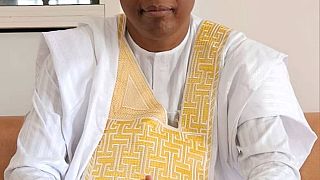
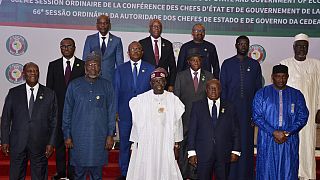
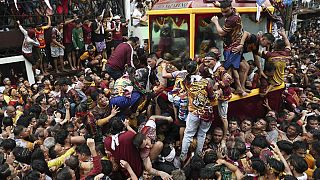
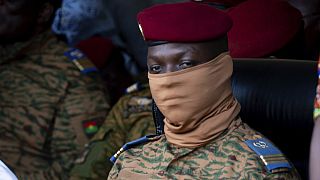
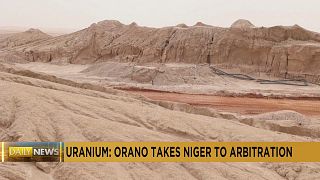
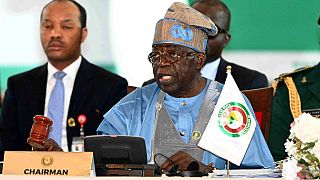
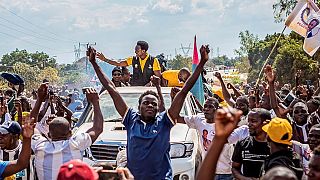
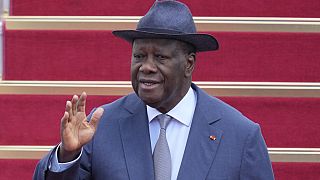

02:28
ECOWAS sets exit date for coup-hit states
01:00
Orano's Niger Uranium Mine Taken Over by Authorities Amid Rising Tension
00:58
EU recalls its ambassador from Niger as relations deteriorate
01:02
Sudan rolls out malaria vaccines to bolster efforts to protect children
01:22
Scaled-down polio vaccination campaign resumes in northern Gaza
01:05
Nigeria to roll out a new malaria vaccine